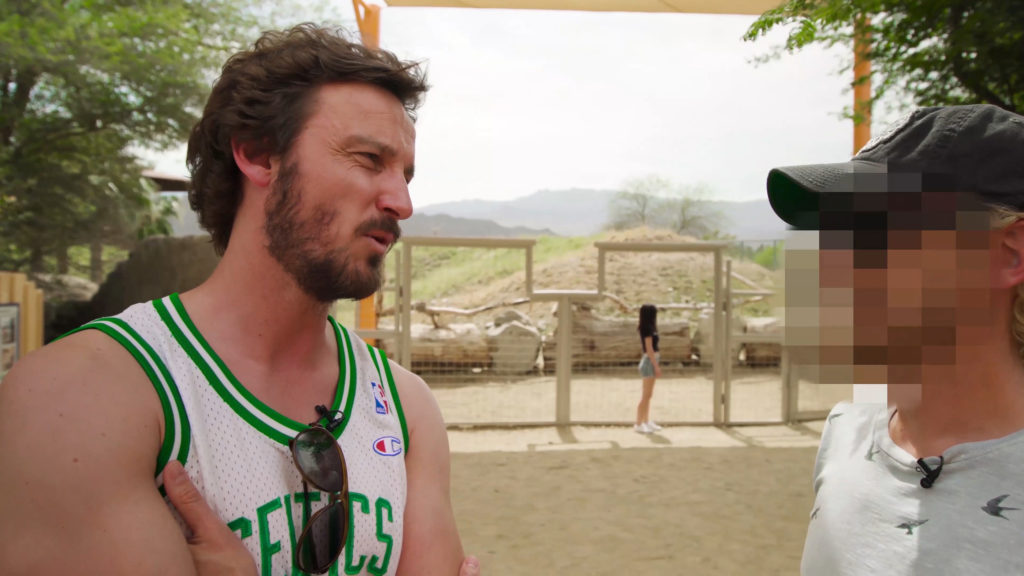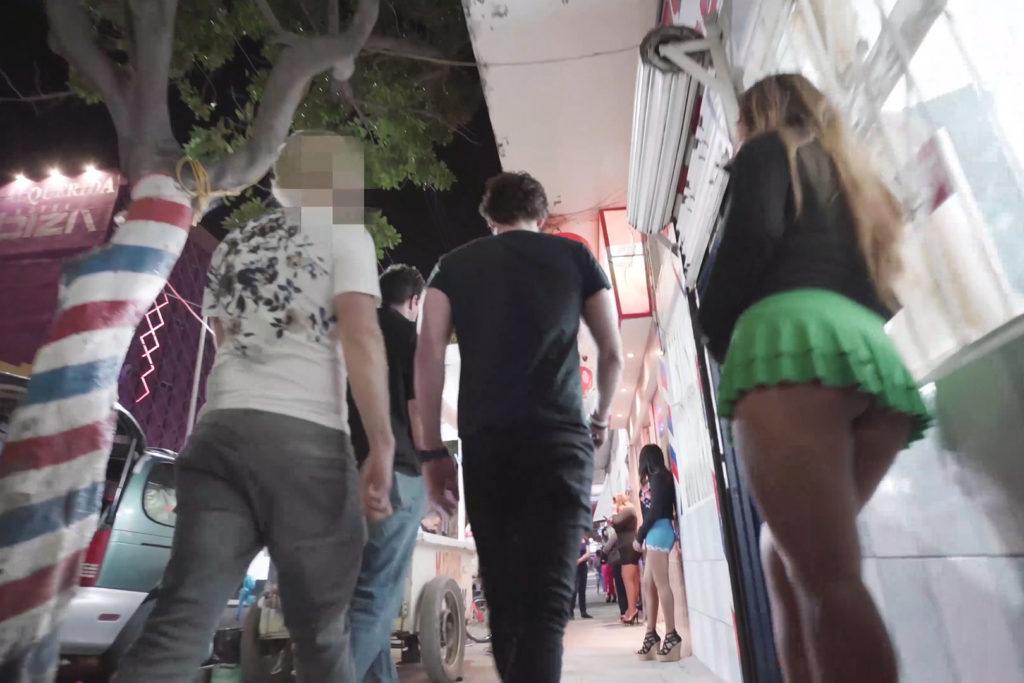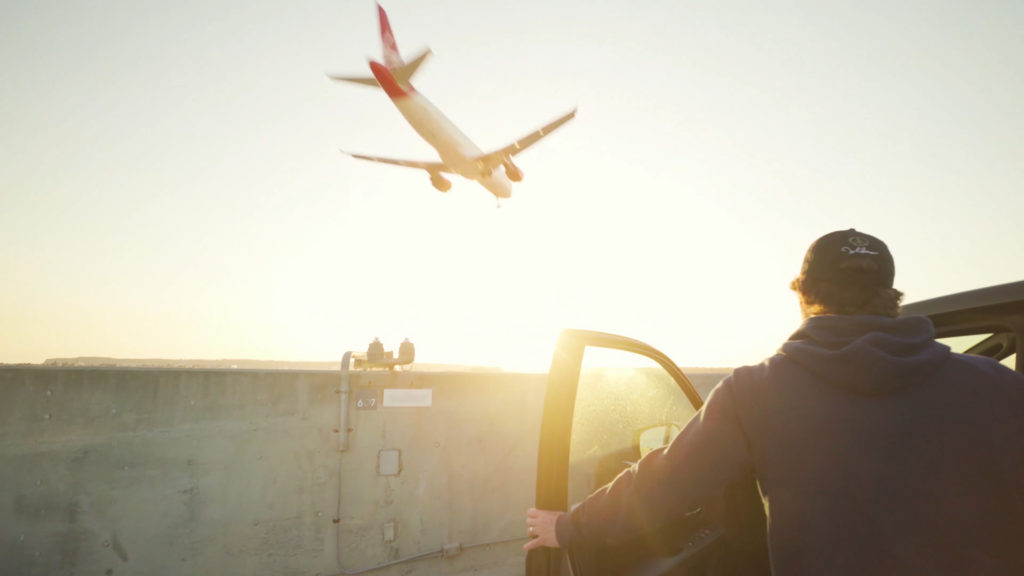Documentary DTF is available now on Digital HD. It’s an engrossing and stranger-than-fiction exposè examining the controversial lifestyle of a long-haul pilot; it’s so good that I personally watched it twice in the same day. Directed by Al Bailey, DTF begins as a project to help find his friend, “Christian”, love again after the death of his wife. Given Christian’s lifestyle, Al and his team want to see whether the popular dating app, Tinder, really works, but early on their project gets derailed by Christian’s odd behaviour. It soon becomes clear that Christian is battling issues of addiction, and has a strong appetite for sexual depravity. Bailey and his crew find themselves drawn further and further into Christian’s world, and things quickly spiral out of control.
DTF is one of those documentaries that takes you by complete surprise and will have you on the edge of your seat. The actions of Christian are so reprehensible that it’s hard to fathom just how someone like this could actually exist. For legal reasons, Christian is an alias, and his identity is obscured throughout the documentary, but this does not dilute any of his actions. It’s an eye-opening, and at times sobering, look at the life that some in the airline profession choose to lead. Having not been able to shake the film from my mind since watching, there was no chance of passing up an opportunity to discuss the project further with the Al Bailey, who had the front seat to all the insanity.
When I sat down to write down my questions, the first few were pretty much all, ‘did this really happen?!’ It seems so insane, it can’t possibly be true. If you had written this as a feature film, people would never buy it and say it was too unbelievable…
Yep exactly, and that question has popped up – ‘was that bit real? Was this bit real?’…It’s a case of it was literally eighteen months… I think we shot for a solid three months, stretched over an eighteen month period, and when you condense…there were times when we’d go to places and he’d be watching Netflix in his room. We came to the conclusion that all the heightened stuff had to be the narrative of the documentary. As you’re watching, it does feel like one unbelievable incident after the other. To be honest, we toned down a fair percentage of it as well. That’s the worrying aspect – there was footage I would not show anyone. Let alone the world.
I have to ask as well, why you settled on the alias of Christian? Given the connotations of the name and his actions – they seem polar opposite.
That was a thought in terms of… his name is not too far removed from that, but at the same time that did strike me when it was said, Christian would be quite… I don’t know whether ironic’s the right word, but almost the opposite of what he probably portrays as his character.
When did you first meet ‘Christian’, and how would you describe your friendship prior to filming?
I always go by football seasons. I was playing football at the time, so it was 2001. I was in Copenhagen on trial, and I was there for four months in total. I knew an Irish friend of mine who was based out in Copenhagen, and I was introduced to Christian, and he was training to be a pilot at the time out in Florida so was going in-between Copenhagen and Denmark. It was just an introduction via another friend while I was out there. Then we kind of lost touch, and then he was based out in the UK when he started to fly.
It comes across that we’re the best of friends in the documentary – I think that’s a bit of a stretch. We kind of played on that a bit to get some emotive feeling behind the character and the relationship. We were friends, but I’m quite glad I’ve not put he’s my best friend as it’s a detriment to my character by association. The fundamental connection is that I introduced him to his wife, Charlotte; that was through school friends. That’s where the real connection is. I was probably more of a friend to Charlotte than I was to Christian. But over a period of time, fifteen-sixteen years, I sporadically had a drink with him.

How did the concept for the documentary come about?
Initially, it was after Charlotte passed. We met up a couple of times and he was talking about what he was getting up to in terms of getting on with his life so to speak. Then through him I know various other pilots that live in the area; they’re almost like one social group, and I’d listen to stories. It’s interesting, the Tinder thing was all to do with the international passport they were talking about in conversation. I found that really interesting, and this is all the initial origins of the idea, and not what we got on screen. The idea of Tinder being localised whilst you’re in a certain country, but with the pilot lifestyle I found it interesting that they could be sat on the tarmac and, if they paid a subscription, they could organise a date on the other side of the world before they took off. That was what struck me in terms of tying the Tinder element into it. That was the idea. Then with Christian’s situation – can you find someone to fall in love with given the way the stories were coming across and how they were living their lives. I thought that would be the challenge because I wasn’t so naive to think I was going to get this brilliantly romanticised ending.
I half kind of knew the world I was getting into, but I didn’t quite understand the depravity of it. It’s very different when you’re talking in a pub or in an office, but when you actually then are living it, and then seeing it on screen, it’s even more depraved than the initial conversation or story you may have heard. It’s a really, really strange kind of experience to think – if he’d have said that in the pub, would that have had the same effect on me as actually experiencing it and then seeing it on screen?
At what point into shooting did you realise the Tinder dating app experience was not the film you were making?
What you see on screen is actually is pretty close in terms of timeline. It was really early on in LA. It didn’t change the thought that it’s not about Tinder and finding love, but I think it got a whole lot more serious for me in the sense that this is completely not at all what was expected. It was almost the first time where we had to think what are we actually making, what are we trying to achieve here? This is obviously really serious, really early doors.
I think what a lot of people not from the film world don’t understand is that, when people have invested a lot of money in something, there’s a massive responsibility. I was first time as a director, and the pressure of that was really hard. I’m not doing everything for money, but I’ve got a responsibility where I’m in the deep end. The whole original idea of finding love was completely kiboshed with the first weeks. It was the first location, but we were two weeks in from starting when that situation arose.
So pretty early on…
Yeah, it was insane.
Pressure’s aside, did you ever think you might not get through to a completed project?
Yes. The problem was…we kind of had two documentaries in the sense that we filmed a lot coming back into the UK with him, and dealing with some situations with him. The way that we’ve dealt with it in the piece is with the split screen and giving the information. But we took a lot of time going to counselling, not sitting in with him, but visiting the place that he was going to. Which was interesting for his character, but not particularly with the story we ended up with. It almost completely took you away from the journey. What we wanted to do literally is throw the audience into what we experienced. That was for us, the narrative. Coming away and dealing with someone whose face you can’t see and you can’t hear, it just slowed everything down and it wasn’t really what we thought the story was about in the end.
With Christian being obscured, you and your crew feature quite a bit within the film. Was it always your intention to shoot that way, or was that something that you realised you were going to have to do?
It was always going to be raw because I’m an advocate of – if you’re going to do a documentary like this, it has to be literally following someone. The whole setting lights up and making it look slick…the documentaries that are en-vogue now are so slick and slightly contrived in the way that they look perfect. That is not what I wanted to make. In a way, that did us a favour once we did have to realise we weren’t going to be showing his identity. It worked as a stylistic thing, but it was always going to be fly-on-the-wall and just shoot from the hip and see where it gets us.
It also works by giving the audience someone that they can relate to and latch onto…
Yeah, as soon as we realised the identity would be out of the question, it was a sense of we’re going to have to be way more heavily involved in his world. Rather than just standing and watching dates, which we still continued to do, and we realised that we had to let him lead us rather than the other way round.

There’s the sequence in Vegas which is really uncomfortable to watch. What were your feelings the next day when you watched that footage back, and were you tempted to keep it out of the film entirely?
So the initial morning, I was obviously not feeling so great. The shoot you see with me watching it with the cinematographer… I had already watched it previous to that. That was purely shot for the purpose of relaying the way that I felt, and the way Nathan felt about it. Initially, when I first saw it, that was almost like the final straw for me in terms of where we were going with it. I didn’t know where to go with it to be quite honest, with what had gone on. Without sounding too over-the-top, it was a bit of soul-searching, you know – ‘is this correct? What would the purpose be of showing it?’ I think I touch on it when we discuss it in the shot. It’s almost we are in this moment and we’ve got to show people the truth of it rather than covering it up, as crazy and disgusting as it was. I think to omit it would have been wrong, and to dilute it would have been wrong. Again, we want the viewer to feel the situation. I think that modern documentaries now lose that little bit of being actually in the documentary, and rather you’re just being taken along on a story.
I was definitely right there with you going through it…
Well to be honest, I wasn’t experiencing a whole lot during it. It was only the after effects of seeing it was quite sobering.
I think it is a sequence that unfortunately a lot of people can relate too on some level. Outside of the pilot hedonist lifestyle that some of them choose to lead, it is a situation that a of people, men and women, find themselves in. I think it is important to show that on screen so that people that haven’t been through are aware that this can happen. I mean, this is something that a friend can do to you… if a friend can do this to you, what can a stranger do?
Exactly. The whole thing really is a cautionary tale.
As tough as that sequence was, it was some of the things that he said in the car conversation that actually made my blood run cold.
It’s horrific. I think what was even more so, was the candidness with how he was. I was fully aware pretty much right throughout that he was playing up to everything. But it was almost like he was hyping and trying to get a response from us so much to the point of, when I watch it back, I’m like, ‘how on earth did I not react more there or there’. That particular bit was the most disturbing, and I’d have to agree with you.

You seem to have the patience of a saint considering his behaviour.
Again, when you’re in the instance, it is a little bit removed from when you see it on screen. You are in the environment. I think a lot of that dampened my response. How I might respond now in retrospect almost is interesting to think about.
What do you hope that people take from watching DTF?
Fundamentally now, after going through and delivering the final piece, for me now it’s almost like a cautionary exposè of this thing that exists. This behaviour pattern should be talked about, and it should be addressed. I don’t think it is addressed to be honest. I think people talk about it and don’t deal with it. I think there has to be a time with toxic masculinity, or whatever this behaviour might be, that certainly in the airline industry they need to address it. It’s pretty deplorable, but a lot of people will say, ‘it happens and it’s been going on for centuries’… Well so have a lot of things that we have issues with. The acceptance of it is the worry for me, and I just hope that this has exposed it enough in a certain manner that it shocks enough people to say, ‘even if it’s just the airline industry, can we deal with it?’ It is a car crash of a documentary. That wasn’t the purpose of the doc from the outset, but I think once we realised what kind of stuff we got on screen, it was a case of, ‘this is what it is now’. It wasn’t what we set out to be, but it’s real life so we’ve got to go with it.
After such an intense experience are you working any more projects?
Yeah, we put this to bed a few months ago before we put it to distribution, so I’ve got a couple [of projects] in the pipeline. One is not too dissimilar to DTF in that fact that it’s a character profile. It involves a betting syndicate based in Asia. It’s around a mathematician, he’s a very interesting character. That could be seen as similar to DTF.
Then the other one is basically a South African township looking to play a game [of football] against a junior football team from England who are from quite an affluent background. It’s the contrast between the township and them. I’ve got certain ideas how we can deliver it based around this junior game and spiralling out from the game to the different stories of the individuals involved. So very different to what DTF was, but it interests me a lot. I want to do something less fly-on-the-wall as well. This [DTF] was something that I wanted to do, and I’ve done it now, and let’s see if there’s something that doesn’t completely kill my soul (laughs).
DTF is available on Digital HD now.
Kat Hughes is a UK born film critic and interviewer who has a passion for horror films. An editor for THN, Kat is also a Rotten Tomatoes Approved Critic. She has bylines with Ghouls Magazine, Arrow Video, Film Stories, Certified Forgotten and FILMHOUNDS and has had essays published in home entertainment releases by Vinegar Syndrome and Second Sight. When not writing about horror, Kat hosts micro podcast Movies with Mummy along with her five-year-old daughter.

Latest Posts
-


Film Reviews
/ 1 day ago‘Companion’ review: Dir. Drew Hancock (2025)
Ever since the teaser launched back in October 2024, audience’s have been very curious...
By Kat Hughes -


Netflix
/ 2 days agoRelease date revealed for ‘Squid Game’ season three
Netflix has unveiled the release date for the third season of their hit series...
By Paul Heath -


Film News
/ 2 days agoMarvel Studios launch ‘Captain America: Brave New World’ in London
Ahead of a release in February, Marvel Studios has officially kicked off the marketing...
By Paul Heath -


Film News
/ 2 days ago‘Cottontail’ UK release set; Lily Franky, Ciarán and Aoife Hinds lead the cast
A UK release date has been revealed for drama Cottontail. The film is described...
By Paul Heath















